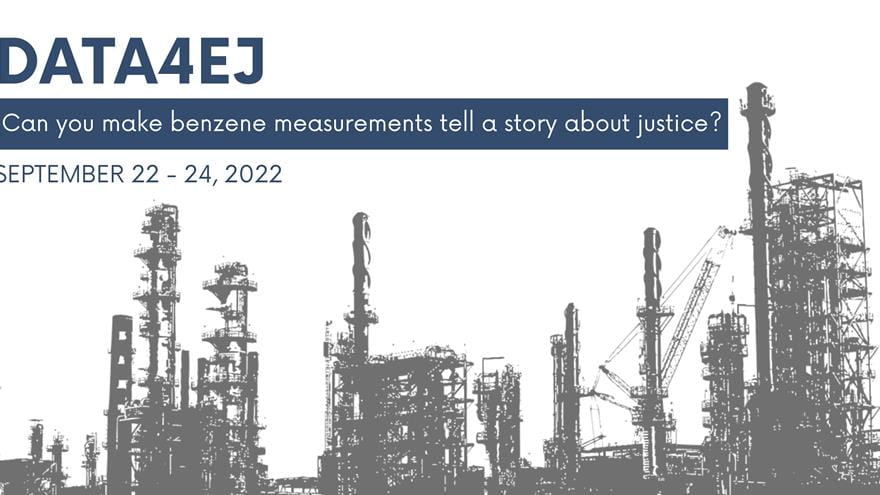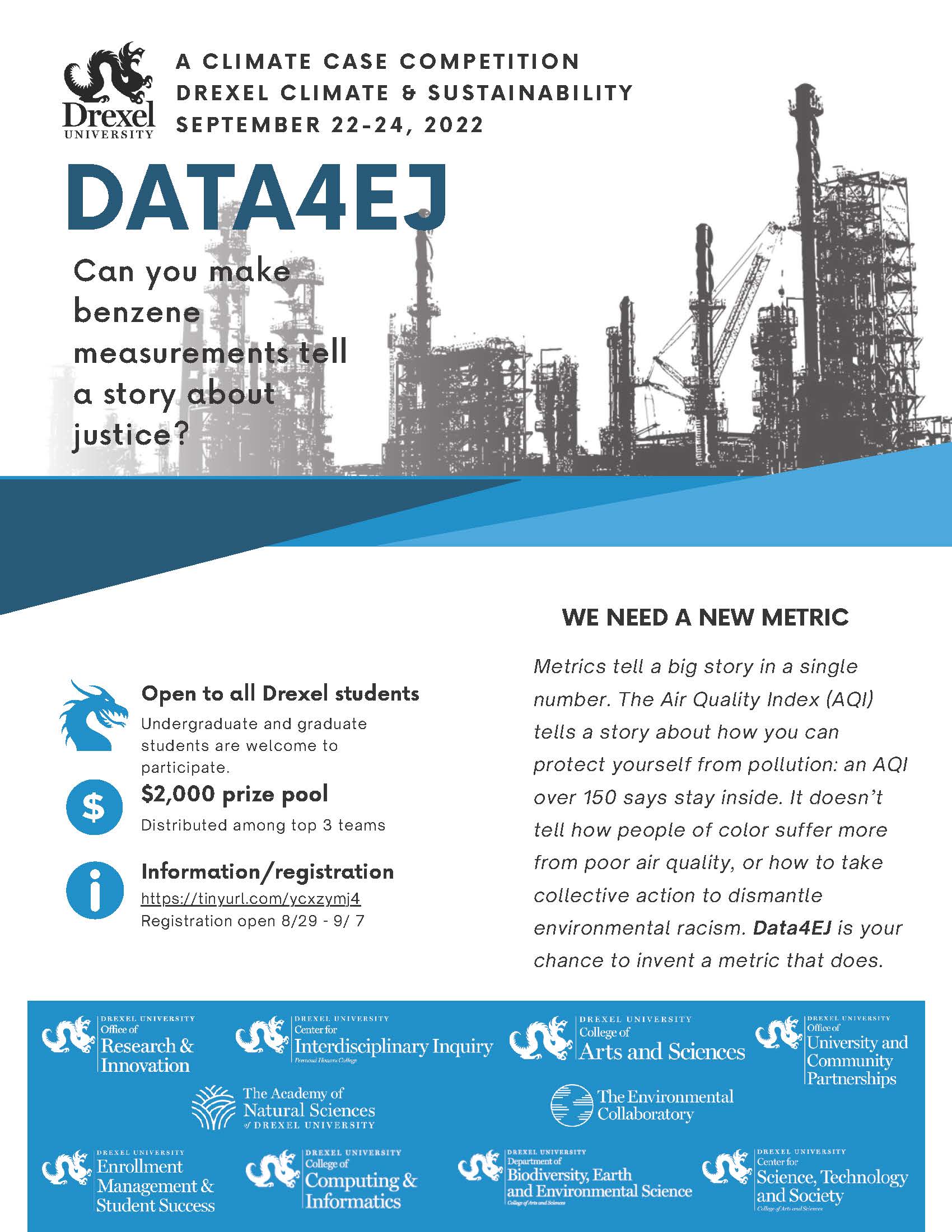DATA4EJ
An interdisciplinary climate case competition for all Drexel students: September 22 – 24, 2022 (Week 1 of the fall term); $2,000 Prize Pool

Can You Make Benzene Measurements Tell a Story About Justice?
Metrics are numbers that tell a big story in an easy-to-understand way. They also direct our attention to what's important. The Gross Domestic Product (GDP) tells us how big a nation's economy is, but the Human Development Index (HDI) tells us whether its inhabitants have the capacity to thrive. Environmental metrics like the Air Quality Index (AQI) can tell us whether it's safe to work outside today, but so far we have few metrics that tell the story of how people of color are more impacted by poor air quality. The AQI tells us how to make individual choices to protect our individual health. What kind of metric could tell us how to take collective action to dismantle structural environmental racism? In Data4EJ, student teams will create a new metric that tells the story of environmental justice, using air quality data from vulnerable communities. They'll then propose policies and actions that can be taken to improve U.S. performance on the new metric.
The winning team’s metric will be shared throughout Drexel information channels, including at our campus locations and through digital dissemination. They will also be presented to environmental justice activists for their feedback, and considered for incorporation into EJ activism.
Participants will register as individuals, and the competition organizers will assign each participant to a team. We will accept all participants who register by the deadline.
Registration Is Now Closed
Timeline
- Registration opens: Monday, August 29
- Registration deadline: Wednesday, September 7
- Teams are notified: Monday, September 12
- Teams must confirm their intent to participate: no later than Wednesday, September 14
- Telling the Stories of Environmental (In)justice Launch Event: Thursday, September 22, 6-8 p.m.
- Mobilizing Measurements Workshop: Friday, September 23, 6-8 p.m.
- Team workday and closing event: Saturday, September 24, 10 a.m.-5 p.m.
Competition Programming
Thursday, September 22, 6- 8 p.m., location TBD
Led by Gwen Ottinger, Ph.D.
Featuring community activists from around the U.S.
What’s it like to breathe oil refinery emissions? How well do environmental regulations protect communities on refinery fencelines? Why is knowing what’s in the air so important for residents? The case competition will open with first-hand accounts of the environmental injustices experienced by fenceline communities, and the work they’ve done to protect their environment and health from air pollution. Competition participants will be presented with their challenge: to use quantitative data to amplify these community stories and help provoke policy change. Organizers will offer an overview of available data sources, including their history and limitations. Community panelists and organizers will be available to answer questions.
About the Presenters
Gwen Ottinger is Associate Professor in the Department of Politics and the Center for Science, Technology, and Society at Drexel University. They direct the Fair Tech Collective, a research group that uses social science to promote justice in science and technology. Since 2001, Ottinger has studied EJ activists’ efforts to expand air monitoring at refinery fencelines and the consequences of fenceline monitoring regulations for environmental justice. They are the author of Refining Expertise: How Responsible Engineers Subvert Environmental Justice Challenges and co-creator of airwatchbayarea.org and thebenzenereport.org, websites that expand public access to fenceline monitoring data.
EJ Community panelists to be announced.
Friday, September 23, 6 – 8 p.m., location TBD
Led by Lindsay Poirier, PhD
Metrics help us make sense of the world around us and can be powerful tools for making claims regarding social and environmental injustices. However, when designing metrics, the stories that ultimately get told can vary considerably depending on what data sources we choose to engage, how we choose to categorize information, what standards we compare data against, and how we communicate uncertainty. As data wranglers and storytellers, we have a responsibility to consider the ways our measurements both produce and delimit insight. In this workshop, we will examine what metrics are and what kind of work they do in the world. We will learn how to track down relevant public data sources and integrate them in ways that meaningfully mobilize measurements. We will also consider some of the ethical pitfalls to metrification and how we might navigate them responsibly.
About the Presenters
Lindsay Poirier, Assistant Professor of Statistics and Data Sciences at Smith College, is a cultural anthropologist of data advocacy, governance and infrastructure. Interlacing methods in cultural analysis and exploratory data analysis, Poirier critically examines how meaning gets made from data—by whom, for whom, under what conditions and toward what ends. Her work is informed by prior work in critical data studies, information studies, the digital humanities and data science. In her current research, she studies the provenance, form, semiotics and uptake of public interest datasets documenting social and environmental injustices in the United States. This work underscores the sociopolitical contexts shaping how knowledge claims about contemporary issues are produced from data, and informs critical approaches to data science practice, policy and pedagogy.
On Saturday September 24, teams will attend a group work session from 10a.m. to 3:30 p.m. This will be an opportunity for teams to finish the development of their metric and to get guidance and ask questions of experts. Lunch will be provided. At 3:30, teams will submit their metrics to the judges panel and three winning metrics will be announced at 4 p.m.
FAQs
Teams of students come together to create potential solutions to a problem. There is a set time limit and specific rules to which every team must adhere.
Case competitions provide students an opportunity to develop and enhance their analytical abilities, critical thinking, oral presentation, and communication skills. In addition, case competitions encourage networking between students as well as with leaders in the Drexel community. Participants in our case competition have reported that they have made new friends and that these are some of the most important experiences they have had as Drexel students. “Data4EJ” additionally offers an opportunity to create and share impactful analyses with Drexel and frontline communities.
This competition is open to all Drexel graduate and undergraduate students.
Participants must register ahead of the September 7th deadline, and teams must confirm their intent to participate with the competition planning team by September 9. Each team will create a unique metric in response to the prompt and present their metric to the judges panel at the end of the Saturday team work session. Each team member should be prepared to fully contribute to the team’s effort. Participants must attend each of the scheduled competition programs:
- The competition launch and community activist panel on Thursday, September 22, 6– 8 p.m.
- The build-a-metric workshop on Friday, September 23, 6 – 8 p.m.
- The team work session and closing event on Saturday, September 24, 10a.m. - 4:30 p.m.
The competition launch event on Thursday, September 22 will include a presentation from competition organizers. The organizers will also be taking questions from the teams, so be ready with your questions about the basic parameters for competition deliverables. The competition organizers will also be available to answer questions throughout the three-day span of the competition.
For this competition, participants will register as individuals, and the competition organizers will assign participants into interdisciplinary teams.
We encourage you to let the competition organizers know if this happens, and we will assign you to a different team.
Yes. Each team is expected to be present at all of the competition programs.
The competition will be held in person, on campus. We will not be offering a virtual option.
We will be providing lunch for the Saturday team work session, and you may also feel free to bring food along to the other sessions if needed: just be thoughtful to other participants!
Not at all! This interdisciplinary competition will match team members with different skillsets and expertise. Analyzing the data and applying the metric is only one step of the whole competition. We need students to bounce ideas off one another and to view this problem through multiple disciplinary lenses. Teams should strive to design a metric that attempts to create meaning beyond answering a basic question about the data.
Fenceline air quality data will be available to the participating teams through publicly accessible websites. Details on how to access this data will be provided at the launch event.
The winning metric will be decided by a panel of Philadelphia area judges, representing a range of perspectives on environmental justice.
The winning team will have the opportunity to work with The Fair Tech Collective to institute their metric as a regular feature of digital tools available to fence line communities. We will share information about the winning metric through Drexel’s information channels.
The first-place team will share $1000, distributed among each team member as Visa gift cards. The second-place team receives $600, and the third-place team $400. All winning teams will need to submit information such as student ID numbers to receive gift cards.
Data4EJ is sponsored by:
- Drexel Climate & Sustainability
- Office of Research & Innovation
- The Environmental Collaboratory
- The Academy of Natural Sciences
- College of Arts & Sciences
- Department of Biodiversity, Earth and Environmental Science
- Center for Science Technology & Society
- Department of Information Science
- Pennoni Honors College
- Office of University & Community Partnerships
- Enrollment Management & Student Success
